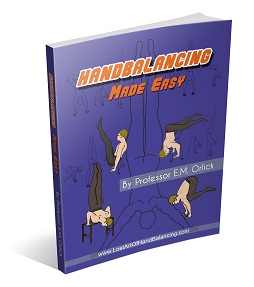Bent arm handstand presses, of the various sorts we’ll cover below, are an awesome show of strength and skill.
The hard part about that is that they require lots of strength and lots of skill to do. That’s probably part of the allure, but it is also what makes them unattainable for most, unless they spend the dedicated practice required.
The difficult part of the skill equation is that you must balance the whole time while doing these. They’re a far cry from doing handstand pushups against the wall. I would recommend to anyone that really wants to get great at these, to spend your time building a solid free handstand first. I would say until you can hold a handstand consistently for at least 20 seconds that you should build your strength another way, as you focus on that skill. (On that note, my Secrets of the Handstand System will help you get there.)
The difficult part of the strength equation is that they have you handle your entire bodyweight with your upper body strength. If you’re a hundred pound gymnast this may not be a big problem. For the rest of us it is.
I remember working on the frogstand press early in my hand balancing career. Not only was the balance hard but each rep was like a max effort press. This makes it hard to work on the “skill” of the movement when it takes everything you’ve got to do it. And it limits the total reps you can do for practice, whether you make them or not.
All bodyweight exercises need to be progressive. That’s one of the hard parts about these. There is no clear progression. You can’t just unload your bodyweight unfortunately. So what I’ve set out to do in this article is give you ten progressively harder presses to work with.
Note: These are all BENT ARM presses. Straight arm presses are an entirely different animal, requiring more flexibility as well as a different kind of strength to do.
We start with the easiest one. Of course to do this you need to have a minimum of strength and balance. We talked about the balance part. As for strength I would recommend being able to do at least 5 handstand pushups against the wall before starting here.
The order of this list is open for some debate. Due to leverages and other factors some people may find that certain skills are easier than others. But I’ve worked with this awhile to find that it works well for me and others I‘ve trained.
1. Frogstand Press
The frogstand is known by a few different names like the crow in yoga. it’s a basic hand balancing skill that can help you on working towards the handstand. So on that note, its great that its also, the starting place for the bent arm presses. From a frogstand, with the knees on the outsides/backs of the elbows, tip forward more and press up into the handstand.
2. Straddle Press
Usually the straddle press is done with the arms locked out, but that doesn’t mean it can’t also be used in a bent arm variation. Spread your legs fairly wide with the hands placed on the ground. Bend the elbows, taking your full weight onto the hands. Bring the legs around and up as you push up into a handstand.
3. Headstand Pushup
Start in a tripod headstand position with your legs straight overhead. From here press up with the hands until you come to a handstand. To make the press a little easier put the hands a little wider than shoulder width.
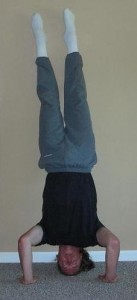
The starting position for this press.
4. Pike Press
Similar to the straddle press, the only difference in this movement is that you’re legs are kept straight and together. This decreases your leverage, forcing you to counterbalance out further and makes it harder to do.
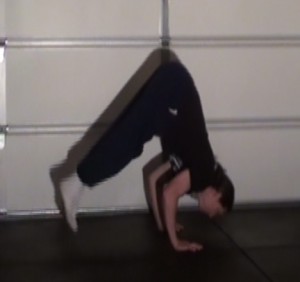
Just after the start when the legs raise off the ground.
5. Handstand Pushup
Kick up into a handstand with the hands shoulder width apart. Lower down touching your nose to the ground and press back up. This can be done with a straight or a curved back, they just change the angle of the press slightly.
6. Tuck Press
Start sitting on your knees (seiza position) on the ground. Press your arms into the ground lifting your body off. Tilt forward, bending the arms then press all the way up to a handstand. This move forces you into a lower starting place and is thus harder to do.
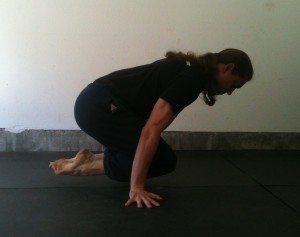
The starting position of the tuck pressup.
7. Belly Roll Pressup
There is some skill involved in this movement. You need to learn how to use your momentum and make a good transition as you do it. This is best to do on a padded surface. Start on your knees with the hips straight. Roll forward, arching the back. Your hands will come touch the ground above your hips. Use the momentum to help you press up into the handstand.
8. Tiger Bend
Start in a forearm stand, that is balanced across the length of your forearms and hands. This requires a curved back position. Shift your weight forward so that you can come onto the hands in the bottom of a freestanding handstand pushup position. Press up. This requires a more narrow stance of the hands and thus requires significantly more strength.
9. Elbow Lever Press
Start in an elbow lever position with the body held horizontal over the ground your weight resting fully on the elbows. Raise the legs up as you start to press with the hands. The hands will need to rotate on the ground to move towards a regular position as you press up.
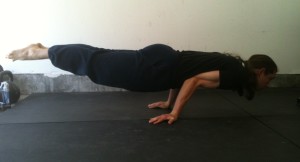
From here press up to a handstand, rotating your hands along the way.
10. Prone Press
Start laying on the ground stomach down. Place your hands by your hips. Lift your whole body and press up to a handstand in much the same way as the lever press. Since you’re starting lower and must support your entire weight, without the elbow support, this one is quite a bit tougher.
This list was made to exist without any tools, like stacked objects or handles. With those added in, you could build out the list a lot further. Also there can be more intermediate steps like playing with hand width more to make each move more or less difficult.
Also note I have not yet personally achieved steps 9 and 10. As I work more towards these I may find some better intermediary steps.

